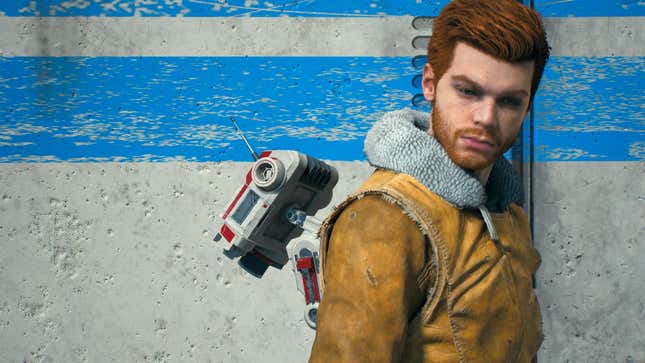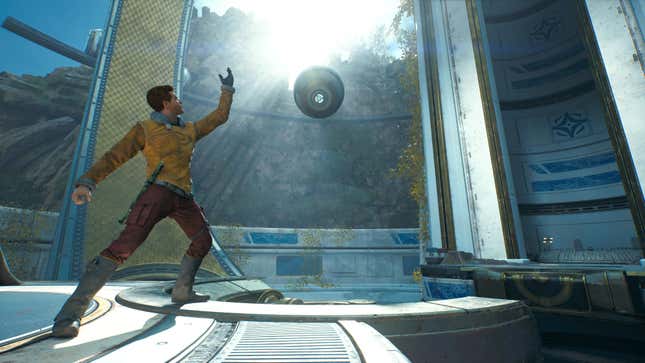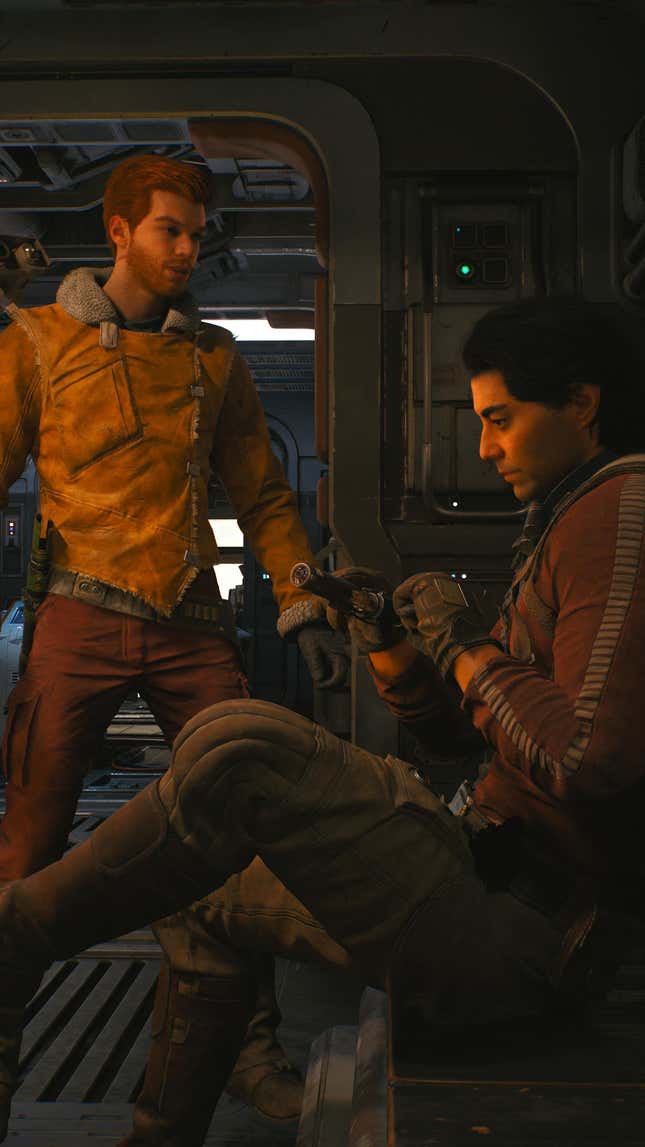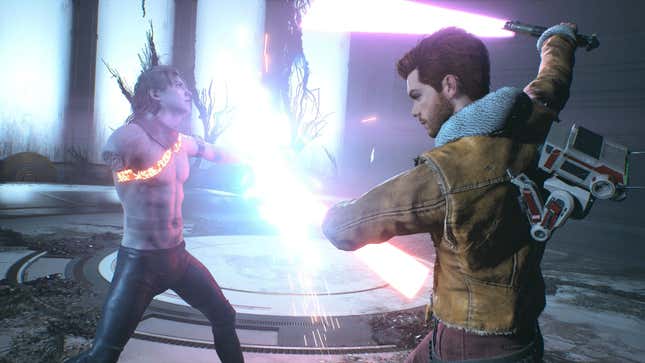
I don’t like Star Wars. No, I don’t mean in the “it’s just not for me,” way but in the “I actively dislike this highly-influential franchise and think it’s bad, actually” way. I find it philosophically detestable in its rigid view of its world and unwillingness to interrogate the oppressive systems it has in place for longer than one movie (the world didn’t deserve The Last Jedi). Plus, I’ll never forgive Disney for dangling queer Poe Dameron in front of actor Oscar Isaac only to take it away in The Rise of Skywalker.
Despite my dislike of the universe, I’ve played my fair share of Star Wars games over the years, but none of them have really hit for me. I’m a loud BioWare fan, but Knights of the Old Republic didn’t capture my imagination, though if the remake ever gets out the door, I’ll be first in line to see how it modernizes old BioWare characters and systems. I played some of Republic Commando’s multiplayer as a kid, but looking back, that was probably not the Star Wars game to hang my hat on if I wanted to play a shooter with my friends.
But now I’m dreading The Legend of Zelda: Tears of the Kingdom’s launch this week because it will take me away from Star Wars Jedi: Survivor. This game fucking whips.

Why does Jedi: Survivor feel so good to play?
Much of what I love about Jedi: Survivor has nothing to do with Star Wars. The root cause of why running around as Space Ian Gallagher tickles the Midichlorians in my brain is that it’s a Respawn game, and the Titanfall developer just knows how to make a game feel good. It shouldn’t surprise me that the studio that made Titanfall 2’s stellar campaign is able to hit the sweet spot of weighty, impactful combat and fluid movement without ever going over the edge into slow or floaty. Every time Cal runs across a wall or climbs overgrowth, the movement is fast enough that I feel like I have momentum, but precise enough that it doesn’t feel floaty or slippery. Uncharted is one of my favorite series, and I love me a slow-paced, methodical climb up some crumbling ruins, but Jedi: Survivor frankly embarrasses it with how good it makes traversal feel.
Read more: Jedi: Survivor Perfectly Mixes Every Era Of Star Wars Together

That same pitch-perfect tuning extends to the lightsaber combat, one of the few times where I’ve been happy to have all the DualSense’s haptic feedback built into the controller—on top of the sound design illustrating the impact of the weapon with every booming thunk when it collides with an enemy and distorted woosh as I swing it over my head, I feel every strike and block in my hands. It might not be the most overt use of the DualSense’s features, but the extra tech helps make every time I take my magenta lightsaber out of its hilt feel like I’m wielding something with weight and force behind it.
Speaking of force, Jedi: Survivor has some of the most intuitive telekinesis I’ve ever used in a game. Cal’s crowd control abilities are as simple as one button press to pull mid-range enemies to him, and then I can use them as cover or send them flying into their buddies as a way to get the upper hand in a fight. Even outside of combat, every time I’ve had to use Force powers to solve puzzles, there’s been no frustration in getting Cal to do what I need him to do. Even having not played the original game, I feel like there’s been little friction when learning how to navigate this world because Respawn found the sweet spot in every mechanic.
Jedi: Survivor is beholden to Star Wars, but still shines through for non-fans
The shame of it all is that if I didn’t think Star Wars was such a mediocre-to-bad franchise, plenty of other aspects of Jedi: Survivor would be tailor-made for me. I love character-driven stories, and not only does Cal’s latest adventure have a lovable cast of weirdos, but it seems to be one of the better interrogations of the Jedi’s place in this universe that I’ve experienced—specifically through antagonist Dagan Gera, a disillusioned Jedi who felt the order abandoned him and his homeland. His debut scene shows his lightsaber’s crystal turn red, indicating a shift to the Dark Side of the Force as Cal tries to convince him the Jedi order can be restored to its former glory, and while I might not believe in anything the Star Wars universe posits, I can at least recognize that within the fiction, that’s a moment. That scene is sold by Respawn’s excellent cinematic direction and Cameron Monaghan and Cody Fern’s acting.

I’m still early in Jedi: Survivor, but if you’d told me I’d be pining for it as I prepare for Tears of the Kingdom, a game from a franchise I actually like, I wouldn’t have believed you. Star Wars is not for me, but Jedi: Survivor feels like it’s a game calling out to me, specifically. It’s a testament to Respawn’s craft that a game from a series I can’t stand is already floating around the top of my Game of the Year list, and based on what I’ve heard, the best is yet to come.




